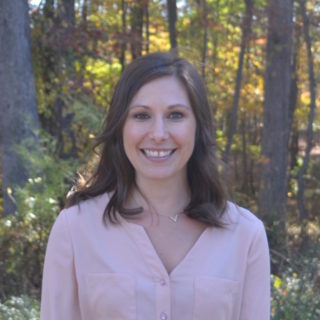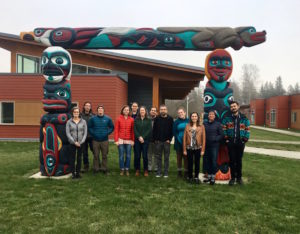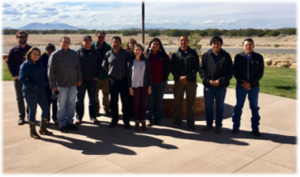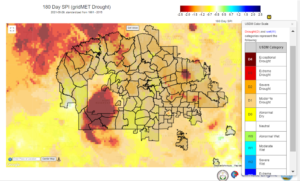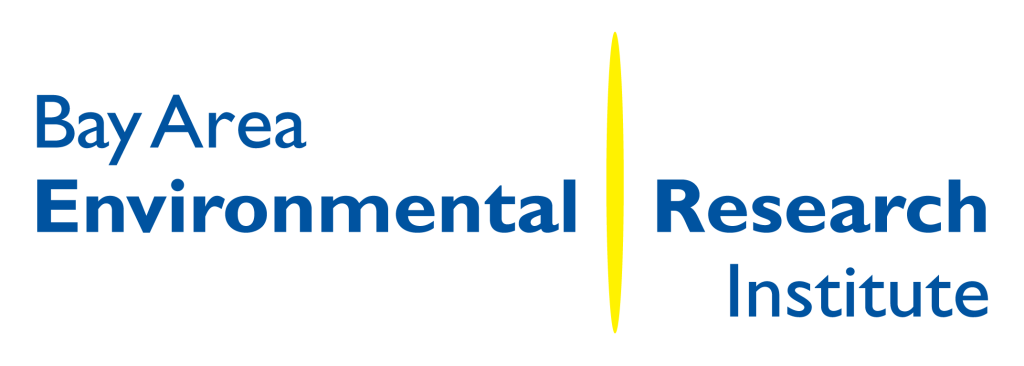Technical Description
The Navajo Nation Drought Severity Evaluation Tool (DSET)
In data scarce regions of the world, co-produced management tools that combine remote sensing, modeled, and in situ data provide the information needed to support ground-based monitoring systems for improved water and natural resource management. On the Navajo Nation (N.N.), in the Four Corners of the southwestern United States, there is a need for data-driven management of water resources as the region is prone to water scarcity and emergency drought declarations, which have become more common under a changing climate. The current tools used by the N.N. Department of Water Resources largely lack the spatial detail, consistent measurements, and political and administrative information specific to their needs for determining appropriate response actions. The Drought Severity Evaluation Tool (DSET), a cloud-based web application that harnesses the capabilities of Google Earth Engine, is a user-friendly tool that pairs remotely sensed, modeled, and in situ data on the N.N. The DSET computing capabilities include on-the-fly generation of regional to field scale maps, time series figures, and reporting metrics that can assist in drought emergency declarations and allocation of relief dollars across the N.N. to the regions that need it most.
OpenET
OpenET is a satellite-based ET cloud computing and data services platform that builds upon decades of research by NASA, USGS and USDA, and involves more than 45 scientists and software engineers from four NASA Centers (ARC, MSFC, JPL, GSFC), USGS, USDA, seven universities including Desert Research Institute (DRI), and non-governmental organization (NGO) and private sector partners. OpenET provides daily, monthly, and annual ET data at a spatial resolution of 30 m x 30 m (0.22 acres) using Landsat, gridded weather data, and an ensemble of well-established satellite-driven ET models implemented on the Google Earth Engine cloud computing platform. Google Earth Engine allows for efficient interoperability across different datasets, massive parallel processing, storage, scalability in time and space, and automated operational updates with new observations that would otherwise be costly and burdensome for State and federal agencies to develop, operate, and maintain. The Navajo Nation is incorporating data from OpenET into their own drought and water management tools, and expanding capacity and outreach efforts to increase the use of OpenET among water managers, farmers, and agricultural communities across the Navajo Nation.
Applied Remote Sensing Training (ARSET)
ARSET offers online and in-person trainings for beginners and advanced practitioners alike. Trainings cover a range of datasets, web portals, and analysis tools and their application to air quality, agriculture, disaster, land, and water resources management. Since 2009, the program has reached over 32,000 participants from 170 countries and more than 7,500 organizations worldwide.
Western Water Applications Office (WWAO)
Our mission is to improve how water is managed in the arid western U.S. by getting NASA science, data, and technology into the hands of water managers and decision makers. WWAO partners with water managers, identifies pressing water issues, and delivers solutions to those issues based on NASA capabilities.
Education
I received a B.S. in Geology and Environmental Geosciences from the College of Charleston, a M.S. in Geology from San Francisco State University, and a PhD in Environmental Studies from the University of California Santa Cruz. My academic career focused on water resource availability with climate variability and change.
Get in touch: mccullum (at) baeri.org
